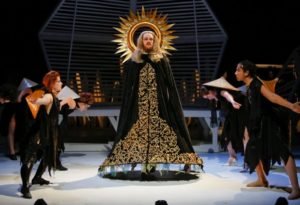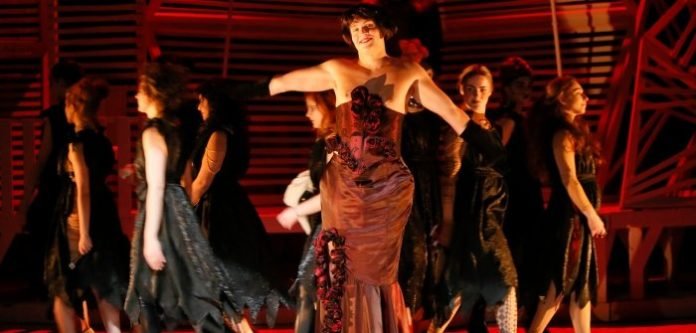There are so many layers to Charles Mee’s The Bacchae 2.1 that it would be easy for anyone not familiar with the story of Euripides’ tragedy on which it is based to become lost in its dense language and wildly heady trip.
[pullquote]Helping to bring all of its disparate parts come together is a cast that is the definition of the word fearless.[/pullquote]Watch carefully though and its source material peeks through the layers that also draws from German literary theorist Klaus Theweleit’s Male Fantasies, Valerie Solanas’ The S.C.U.M. Manifesto and Joan Nestle’s Lesbian Herstory Archives. While familiarity with some of the material that Mee draws upon may be foreign to most (including myself), it does help to have some knowledge of the original Greek tragedy going in, as it is the glue that holds it all together.
Renouncing family and responsibility, a group of Thebes women escape to the mountains to workshop Dionysus (aka Bacchus), the god of wine and ecstasy. With King Pentheus bent on revenge against the women, Dionysus convinces him to dress as a woman and to spy on them rather than have them killed. With his disguise eventually discovered, the women, led by his own mother Agave, kill him.

Told in modern language, Mee’s sometimes poetic text is punctuated by explicit language and the equally explicit visuals from the minds of MFA Directing student Dennis Gupa and costume designer Kiara Lawson. From a phallic wearing ram to a woman seemingly suspended from her skin by hooks, Gupa and Lawson seemingly take all of Mee’s inspirations to heart. Natalia Ruiz’s stark white set with its moveable pieces at times feels a little fussy as it is pulled apart and re-configured, but it allows Lawson’s costumes to pop.
Helping to bring all of its disparate parts come together though is a cast that is the definition of the word fearless. Whether it is Thomas Elms as Dionysus in iridescent hot pants, Matt Kennedy revealing and embracing his feminine side, this entire cast commits to Gupa’s vision from start to finish. And this is no easy task given Mee’s dense script, where the audience is at times left behind. Other stand-outs here include Ghazal Azarbad as the Orange Woman who gives a second-half speech that is rich and Helena Fisher-Welsh as Agave who ultimately captures a mother’s anguish at the realization of what she has done. Special mention must go to the female ensemble (Mariam Barry, Allyce Kranabetter, Jenna Mairs, Demi Pedersen, Meegin Pye, Kelsey Ranshaw, Selene Rose, Joylyn Secunda, Parmiss Sehat, Elizabeth Willoughby) who are as equally fearless in embracing some of the more sexually charged scenes.
With a history of presenting more classical works, one would have expected the UBC Department of Theatre and Film to present The Bacchae in its original form. And while not everything works in this modern adaptation, this ambitious undertaking, for both audience and cast, is a surprisingly and welcome change. It also helps to have a cast and creative team fearless enough to take up Mee’s challenge.
The Bacchae 2.1 adapted by Charles Mee from The Bacchae by Euripides. Directed by Dennis Gupa. On stage at the Frederic Wood Theatre (University of British Columbia) until February 7. Visit https://theatrefilm.ubc.ca for tickets and information.

